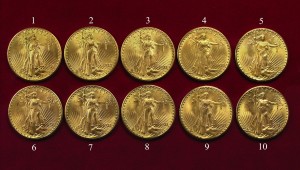
The ten 1933 Saint-Gaudens Double Eagles confiscated by the government from Joan Lanbord, daughter of Israel Switt.
The original suit was filed in the U.S. District Court in Philadelphia by Barry H. Berke on behalf of Joan Langbord, the surviving daughter of jeweler Israel Switt, and her sons Roy and David. Berke is no stranger to these types of law suits. He represented the plaintiffs in the case that resulted in the sale of the Farouk coin in 2002. In July 2011, the jury returned a verdict declaring the coins to be government property.
The verdict left a lot of question about the legality of pattern coins. One example cited was the 1974-D Aluminum cent. However, on April 6, a federal judge in California ruled that the coin could have legally left the Denver Mint. This does not end the battle for the cent. All it does is dismisses the government’s claim for summary judgement against the plaintiffs Randall Lawrence and Michael McConnell.This case is different since it is further along and about what was to be a circulating coin.
The ruling, written by Judge Marjorie O. Rendell,† centers around the government’s use of Civil Asset Forfeiture Reform Act of 2000 (CAFRA). CAFRA was passed as a “eact[ion] to public outcry over the government’s too-zealous pursuit of civil and criminal forfeiture” and as an “effort to deter government overreaching.” The government said that the Langbords did not file their suit within the 90-day time period. However, the ruling says that it does not imply because “Congress has specifically enumerated theft or embezzlement of government property as one of the crimes to which CAFRA applies.” Since the government called the assets stolen and then ignored the Langbords’ claim for the government to return the coins, they did not prove that the assets were embezzled and CAFRA does not apply.
In the areas where CAFRA did apply, the government did not respond to the Langbords’ request for return of the assets within the 90-days required by law. “The Langbords are correct in urging that we reject these arguments. The Government was required either to return their property or to institute a judicial civil forfeiture proceeding within 90 days of the Langbords’ submission of a seized asset claim.”
The three judge panel concluded “he Langbords are entitled to the return of the Double Eagles.” The appeal overturns the lower court’s ruling and the Appeals Court “will remand for the District Court to order the Government to return the Double Eagles to the Langbords.”
This may not be the end of the story. The government can ask for a temporary stay of the order in order to file an appeal. At that point the government attorneys can either appeal the ruling by the three-judge panel to the full Appellate Court (a full 9 judge panel) or directly to the Supreme Court.
My opinion: considering how the government has behaved throughout the saga of these coins, I think they will try to appeal this ruling to the full Third Circuit. It drags the case out longer and allows the government to put its considerable heft against the the Langbords. I do not think the government will settle this suit in a similar manner that the King Farouk coin was settled. However, if I understand the procedures correctly, the Langbords can claim that the case has significant public interest and ask for it to be heard by the Supreme Court. The Supreme Court then will decide to hear the case or let it be heard by the Third Circuit first. Regardless, I think the next stop is the Supreme Court where the most fascinating story in U.S. numismatics will be settled.
Or will it?
Image of the Aluminum cent originally from the Smithsonian Institute.



Scott,
This case makes me so furious toward the Federal Government that I cannot put it into words. The is no shortage of big time crime in this country. The Government should go after those people and forget about the Langbords. .Is anybody still wondering why so many people are angry at or have little confidence in the Federal Government?
Federal Law on these coins goes back to when President Franklin D. Roosevelt made gold ownership illegal. In case the Federal Government’s left hand does not know what the right hand is doing, gold ownership has been legal for 40 years.
I could go on and on regarding this subject, but I will stop here except to ask a question you might not know the answer to. Suppose the Langbords tried to sell the coins in another country? I would have looked into that possibility.